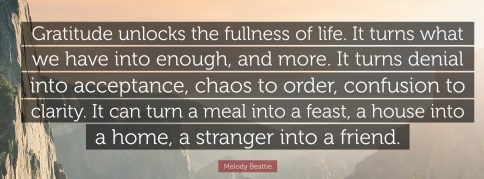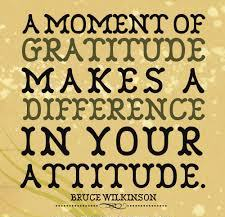Namaste!
Gratitude. Define It.
A word deriving from Latin ‘gratus’ meaning pleasing or thankful. To think that one of the most non-selfish emotions or feelings, is simply expressed in 3 syllables (grat-i-tude) is phenomenal. This word clearly means a great deal yet is so scarcely expressed. It can be described as the quality of being thankful and appreciative, and therefore could also be viewed as a portmanteau (the process of merging two words into one) of grateful and attitude, i.e. grat-itude!
Whilst I could ramble on about the linguistics of the word (and clearly studying Law for 3 years along with A-Level English has made me a linguistic geek!), what do we actually mean by gratitude? How is it expressed in day to day life, if at all?
Explain It.
Note, that gratitude is rather subjective. There is no objective standard against which gratitude can be measured, or lack thereof. It comes from within, and as individuals we all may be grateful for different things. Quite commonly, it is a buzzword, triggering responses of gratitude for family, friends, material objects, and so on. However, at my recent YFS training day this was the theme of Sumitji Sharma’s discussion. He proposed a view that why are we not immediately grateful for a heart or a brain?
We have not done anyt
hing substantially to earn or deserve these organs, and the irony is these (along with other organs) are what keep up alive. Although we are blessed with these, we often disregard its impor
tance and the gratitude we should have towards it. The disclaimer here is that I’m not proposing to change your response in relation to what you are grateful for, as it is personal, however it is definitely something to reflect upon.
What am I grateful for?
It is perfectly natural to be grateful for a 50” Samsung Smart TV, or the iPhone X however these are material objects, and quite frankly our lives would still go on without these. However, without a brain as the central organ for the nervous system controlling most of our activities, or a heart to ensure we have blood circulating around our body, our lives would cease to exist. This is the key distinction.
During the discussion I recall being grateful for a number of things: my family, friends, being able to live a com
fortable lifestyle, health, being educated, having a job and family support allowing me to buy ‘luxury’ items such as smartphones, computers and even gold (as some of you may know, this one is quite important to me!). However, by the end of the discussion I had felt my horizons had broadened in viewing gratitude as a sentiment, and a ‘hierarchy’ of things one should grateful for. I envisage this as a pyramidal structure with organs, the body, good health, warm food, clean water, a home, etc towards the top, and then material objects towards the bottom.
Perspective is crucial.
Often despite having all these basic things for living a ‘comfortable’ life, we still have ‘bad days’. Why? What don’t we have? This is an issue of perspective and it depends whether one focuses on the positive, which often stems from gratitude (i.e. I am living, I have a roof over my head, I have food in my stomach) or the negative (i.e. someone spoke to me rude
ly, I got drenched in the rain and my hair is ruined, etc). This links perfectly to the quote of the blog, stated at the end of the article!
Practice It.
Why do we not express gratitude more then? As a generalisation it is probably safe to say that we are all grateful for our lives and the people and things that are in it, as listed above. However, why do we not express this more? This lack of expression occurs across both genders, and therefore is not connected with the stereotype that men shouldn’t show emotion as that emasculates them (let the record show that I do not agree with this stereotype at all!). A theory I have is vulnerability, and the general view that if you share emotions you are more vulnerable, which is not necessarily a negative thing at all. Linked to this is pe
rhaps the idea of ahaṃkāra (ego). As humans, it is human nature to perhaps be proud of certain things, achievements, etc, and often without realising, these can manifest into ego. I think we have all fallen victim to this at time, and will probably continue to, however if we aim to reduce or eradicate this, then these factors will not stand in the way of us expressing our gratitude.
For example, with family members, how often do we thank our parents for all that they have done and provided for us? Or our friends for being there when you needed them the most? In the family sphere, we often find it ‘weird’ to engage in common pleasantries and courtesies that we would happily engage in, with a complete stranger (e.g. holding open a door/saying thank you for that act). Again, the idea that relationships do not define the parameters of gratitude is something that was explored in the discussion, and that there is no ‘mo
del’ form of gratitude, it varies among situations and people.
In the western world we are largely guilty to possessing a rather materialistic side to ‘gratitude’, which is not necessarily bad either. For example, being grateful for the fact that you have a bed, a warm duvet, pillows, etc are all forms of material gratitude but again for a homeless person this would probably mean the world to them. Whilst material gratitude in the form of gadgets, eating in fancy restaurants, etc, is in a different realm, and may perhaps be one of the areas that would slot into the base of the gratitude hierarchy pyramid. The balance as Jim Rohn states is to ‘learn to be thankful for what you already have, while you pursue all that you want’.
What’s sewa got to do with gratitude?
Whilst I think we all ar
e truly grateful for what we have, expression is the largest hinderance. Often once you are able to openly admit something and share that emotion, you grow as a person. This is the moral underpinning of sewa; appreciating and being grateful for all that you have, and striving to help others, without any expectation of a reward. This is something I am learning through my journey with YFS, and it is something that can make us all better people.
Quotes of the Blog:
“Feeling gratitude and not expressing it, is like wrapping a present and not giving it” – William Arthur Ward.
“Reflect upon your present blessings, of which every man has plenty, not on your past misfortunes, of which all men have some” – Charles Dickens.



